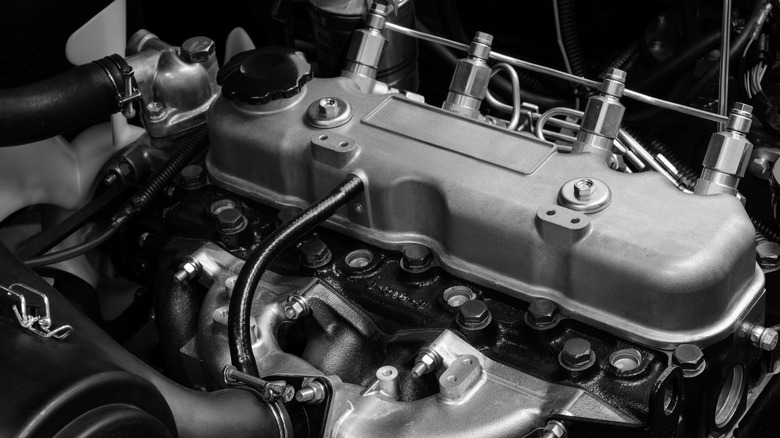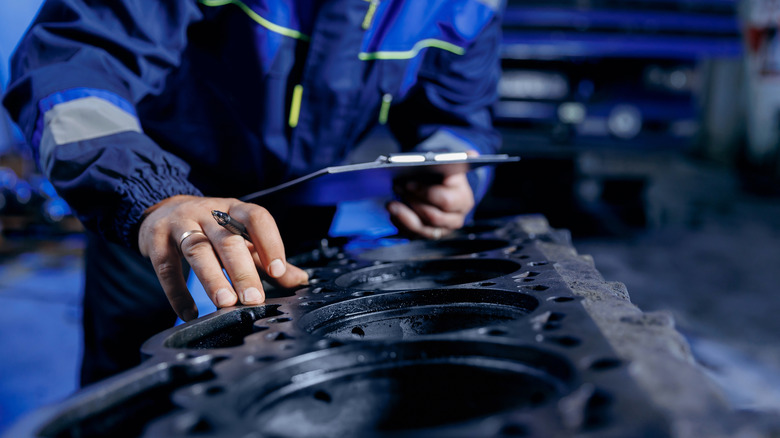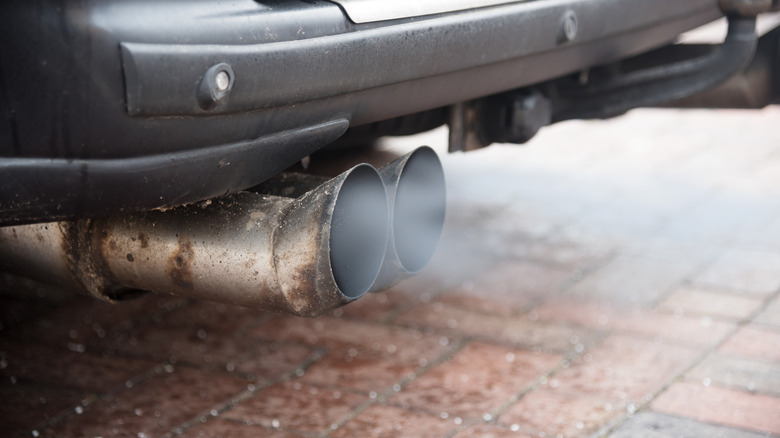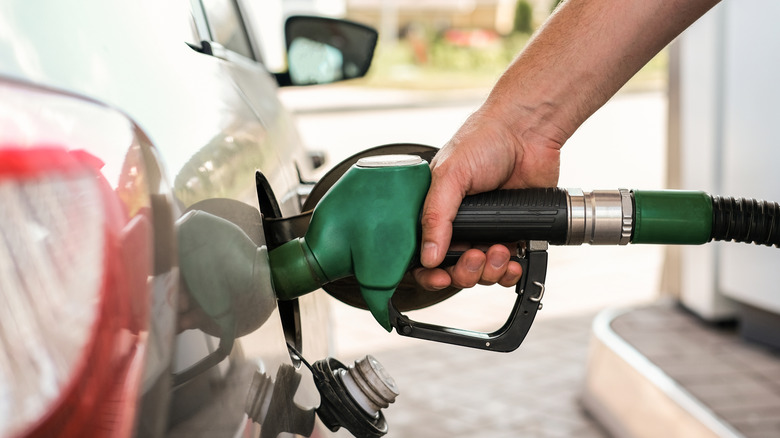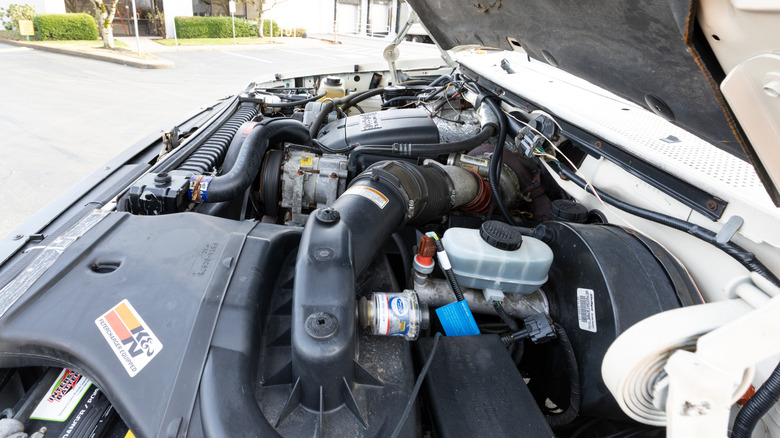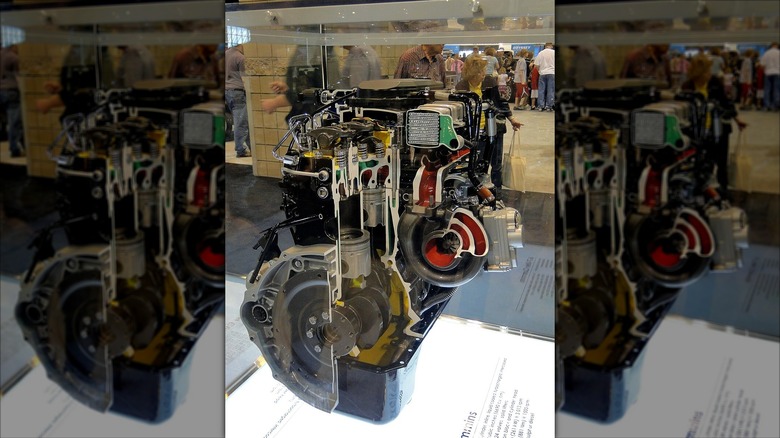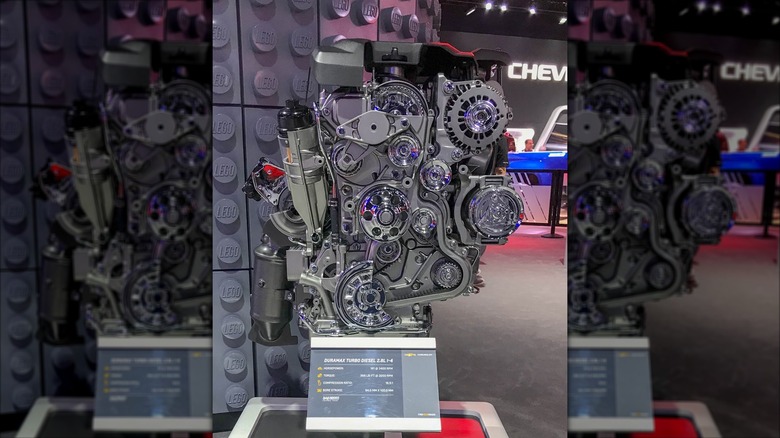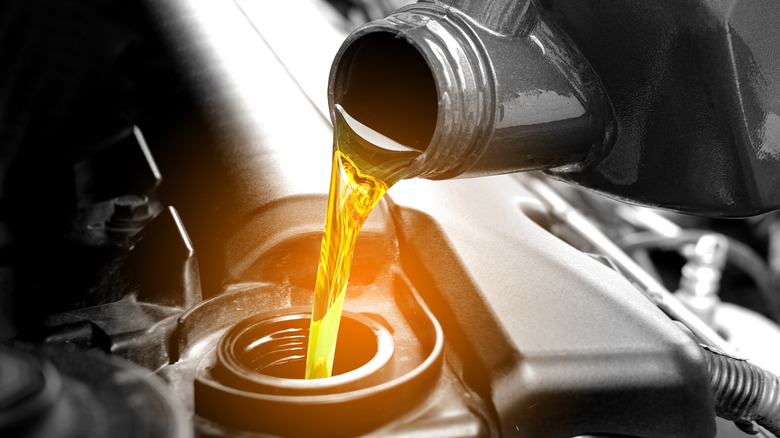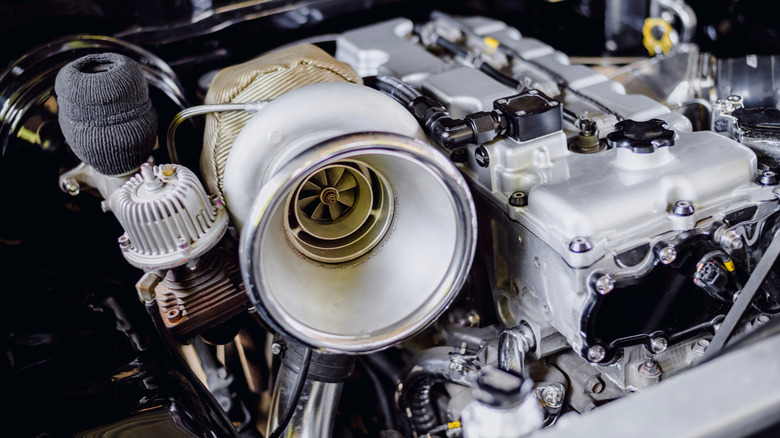10 Diesel Engine Myths You Need To Stop Believing
When it's time to buy a new vehicle, you may find yourself at a crossroads wondering whether to go with a standard gasoline engine or a spiffy diesel variant. Diesel engines are known far and wide for providing superb acceleration and towing potential. But that only scratches the surface, and there are many other things you might not know about diesel engines worth learning about. Of course, for every true fact out there, there's a ton of misinformation and straight-up diesel myths that have persisted about this technology.
It's easy enough for a myth to spread. Sometimes, someone will get faulty information from a source and then tell it to everyone they know. Certain details about diesel engines were true years ago, but the technology has since come a long way to where it's no longer really a problem.
Either way, it's good to cut through the treacle so you can make an informed decision. There are definitely pros and cons to diesel engines, similar to gasoline ones, so it's paramount to do as much research as possible to wind up with the perfect vehicle for your needs. Let's look at some of the stuff that's straight-up untrue.
More expensive to maintain
Money will always be a major factor when considering what type of vehicle to get. Diesel automatically loses some points in this department, as they tend to carry a higher upfront cost compared to gas. In general, a person can expect to spend anywhere from $5,000 to $10,000 more on a diesel truck than a gas one. There will naturally be other costs to consider in the long run, with many people online talking about how diesel engines ultimately cost more to maintain. However, there's a larger picture worth looking at.
While individual replacements and repairs tend to cost more with diesel engines, you generally don't need to take it to a mechanic as often as a gas engine. This is thanks largely due to diesel engines having fewer components compared to gas. For example, diesel engines don't rely on spark plugs to ignite fuel. Instead, they ignite diesel by compressing a combination of air and fuel.
Plus, there's also the matter of longevity. While other factors play a part, many gas engines typically tap out around 200,000 miles. Diesel engines can often go anywhere between 300,000 miles and 1,000,000 miles. As long as you follow some essential diesel engine maintenance tips, it might be a while until you spend a ton of money upfront again on a brand new vehicle.
Diesel engines are loud and dirty
This diesel myth actually used to be true. Years ago, diesel engines would emit more soot and harmful pollutants like nitrogen oxides into the atmosphere. When people have images in their heads of massive trucks billowing black clouds behind them, they're probably thinking of diesel engines from the past. Fortunately, great strides have been made to vastly reduce the output from these engines to pretty much put them on par with gasoline engines.
The Energy Policy Act of 2005 led to the development of the Diesel Emissions Reduction Act Program. This opened the door for greater funding in producing cleaner diesel technology, such as the addition of a diesel particulate filter, which captures particulate matter before entering the local environment. Nick Molden, chief executive of Emissions Analytics, told BBC, "The filters clean up 99% of the particles. So long as they are not tampered with, they are very effective."
The general rule of thumb is that if a diesel engine was made after 2007, it likely has these newer standards. And with continued research and development, diesel engines are likely only going to get better as the years go on.
Diesel is hard to find
Gas stations are everywhere, but not all of them carry diesel. This is a specialized fuel you must use to fill up your vehicle if it has a diesel engine. If regular gas gets into your diesel engine, you need to follow some strict steps to circumvent catastrophic damage. Even outside of that, some people may worry about finding diesel when they're running low on fuel. For the most part, this fear is unfounded.
You may not find diesel everywhere, but it's certainly plentiful. For instance, the number of retail fuel stations in California that offer diesel has steadily increased over the last decade (not accounting for a slight dip from 2020 to 2021). As of 2023, there were 5,511 diesel locations across the state. And if you live in a major metropolitan area, you probably won't have any issues finding at least one station near you that provides diesel. Considering that most big rigs use diesel engines, stations should also have it along interstates.
Diesel technology isn't going away, and many locations have realized the importance of offering different fuels for drivers. Additionally, since diesel engines offer greater fuel economy, you're able to go longer between fill-ups, so you have a bit more of a cushion to finding something suitable.
Diesel engines are less powerful
Given how vehicles with diesel engines generally cost more than gas, it's no wonder that a few perks should come your way. Some of those benefits include greater power, torque, and fuel economy.
The reason why diesel engines have more torque than gas cars comes down to the higher compression ratio. Diesel fuel comes with about 11% more energy than gasoline. The combustion chamber is capable of getting a higher level of heat, which ignites the fuel, allowing drivers to haul heavier loads without needing to worry as much about slowing down. As mentioned earlier, big rigs usually have diesel engines for precisely this reason.
The turbocharger is also essential for getting the most out of a diesel engine. This is what compresses the air before it gets into the chamber, and while they don't come with every engine, many modern cars and trucks feature them now. In addition to boosting the overall power, turbochargers also help with fuel economy, another major perk when it comes to carrying heavy items across long distances.
Ford owns Cummins engines
It's a little odd to see how pervasive the myth that Ford owns Cummins engines continues to be. There wasn't even a point in time where Ford owned the company. The closest it came was in 1990 when Ford acquired 10.8% of the capital shares in Cummins, which wouldn't have been enough to make Ford a majority shareholder. All it did was give Ford a spot on the board of directors.
Throughout the '90s, Ford's F650 and F750 lines of trucks came with Cummins engines, which likely got even more people thinking that Ford owned the company outright. However, in 1997, Cummins purchased back all of Ford's stock in the company, resulting in a total divestment. This was advantageous for Ford, too, as it helped bring its total costs down, and prompted the company to start making its trucks' engines in-house.
Ford may have had a partnership with Cummins in the past, but it never owned it. Cummins still produces plenty of powerful diesel engines, and if one wants to get a Cummins product in their Ford truck, there are ways to retrofit it.
Diesel engines struggle to start in the winter
A modern myth that just won't go away is that you need to warm up any car before driving off in the winter. In fact, you may even do more harm than good by allowing your vehicle to idle for several minutes, as it could actually increase the amount of friction within the engine's components. This myth exists for diesel cars, too. They may experience a little more pushback in colder months compared to their gas counterparts due to the need to create high temperatures through compression. Getting to those higher temperatures is inherently tougher when it's colder out, but it shouldn't really necessitate idling a car for an extended period of time since diesel vehicles generally come with block heaters.
A block heater is a component that keeps specific engine parts slightly warm even when it's not moving. This means the engine won't inherently be as cold as the outside temperature, allowing you to start your vehicle and getting it to those higher compressions faster. It's particularly useful if you plan on hauling heavy items in frigid weather. Such loads put even more strain on the engine, necessitating those higher temperatures to get it running optimally.
In the event you don't have a block heater already, it's simple enough to purchase a kit. You'll need to plug it in and keep it that way for a few hours before you plan on driving. It requires some foresight, but if you live in an area that gets extremely cold in the winter, it's a must-have.
Isuzu makes the Duramax diesel engine
Debunking the myth that Ford owns Cummins engines is pretty easy, but we have to go a bit more into the weeds to analyze Isuzu's partnership with the Duramax diesel engine. We need to go back to Duramax's roots in 1998. Beginning as a joint venture to develop a more powerful diesel engine, DMAX Ltd. was initially co-owned by Isuzu (with a 60% share) and General Motors (with the remaining 40%).
This is likely where the myth comes from, and while it was true decades ago, the dynamic of ownership has altered. Eventually, the numbers reversed to where General Motors owned 60% and Isuzu had 40%. In 2022, Isuzu sold off its remaining shares, meaning General Motors currently owns the entirety of DMAX Ltd.
Isuzu still partners in making diesel engines elsewhere. It actually worked with Cummins going back to 2019, and in May 2024, it was announced the two organizations would produce a new 6.7-liter engine to go in Isuzu trucks. Isuzu chairman and representative director Masanori Katayama said this of the venture in a press release: "Isuzu and Cummins leadership has established strong mutual trust and respect of each other since the first day of our partnership. I am confident that our strategic partnership will continue and expand over future generations of respective leadership."
Vegetable oil works as diesel fuel
You should know never to put regular gasoline into a diesel engine, but there's a myth about how vegetable oil could function as a suitable substitute. While it is true that certain biodiesels, in an effort to reduce emissions, contain vegetable oils, you shouldn't just pour a bottle of Crisco directly into your car.
There are numerous other components to genuine biodiesel that make it suitable for a vehicle's operation. Studies have been done to determine the impact of using vegetable oil for diesel engines only to find that it can drastically reduce the lifespan of said engine. The United States Department of Energy even put out a report to debunk this diesel myth, asserting, "Compared to No. 2 diesel fuel, all of the vegetable oils are much more viscous, are much more reactive to oxygen, and have higher cloud point and pour point temperatures."
The report continues to say that vegetable oil may be fine for short-term use, but there's also the matter that improperly using vegetable oil as fuel is illegal. The Environment Protection Agency has stated how drivers shouldn't use anything to fill up their vehicles that doesn't contain EPA certification. There may be hope in the future to start using unique substances to power vehicles to lessen the population's dependence on traditional fuel, but more work is needed.
Diesel engines work worse at higher altitudes
Gasoline-powered vehicles can have a harder time working at maximum efficiency at higher altitudes. This is due to the fact gas cars require a specific ratio of air to fuel. Since the air becomes less dense the higher up you go, certain vehicles may struggle. This may naturally lead some to believe that diesel engines have the same problem. In actuality, diesel-powered trucks tend to work just fine as you venture into the mountains.
Of course, there are numerous factors that can impact performance at higher altitudes, so nothing is an absolute given, but diesel trucks are better equipped for such areas. Turbochargers help immensely in the mountains, as they more easily pull the thinner air into the combustion chamber. It can increase the mass of this lowered quantity of air to increase the odds of the engine running at peak performance.
With the proper combination of factors, a diesel vehicle can easily speed up a mountain while most of the other cars struggle. There could still be a slight decrease in performance compared to what the driver is used to, but diesel trucks are far better equipped for this task than gas.
It's fine to idle a diesel engine
Regardless if you have a diesel or gas engine, there's generally no need to idle for extended periods of time. Sometimes, you can't help it, like if you're stuck at a red light. But outside of those types of situations, it's almost always better to turn the engine off and then turn it back on if you plan on keeping your vehicle in the same spot for a while.
As stated previously, there's no need to keep a diesel truck idling during the winter to warm it up. It'll be okay to drive almost immediately. Additionally, a driver doesn't save any money in terms of fuel costs to idle in lieu of stopping and restarting. Idling a heavy-duty truck for one hour burns approximately 0.8 gallons of fuel. That's not even getting into how idling is terrible for the environment, and there could even be local or state laws that prohibit idling in certain circumstances.
Whether you plan on buying a vehicle with a diesel engine or already have one, it never hurts to learn more about how to get the best possible performance out of your ride. Many of these diesel myths may have started with good intentions, but it's good to separate fact from fiction so that you don't accidentally do something you regret later.
